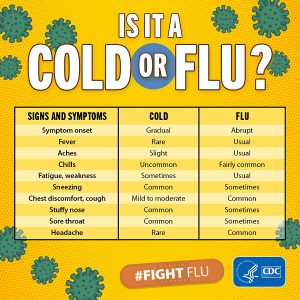Five Things You Need to Know About Flu Season
Posted on by
“It’s the least-fun, viral time of the year…” The indicators that CDC uses to track U.S. flu activity have been high this season (2019-2020). That’s the bad news.
The good news is that the indicators that track severity–hospitalizations and deaths–are not high at this point (January 2020) in the season. Lots of people are catching flu, but, thus far, most cases haven’t been life-threatening.
The flu can be scary, but there are ways that you can practice personal health preparedness before and during flu season. Here are some ways to prepare and protect your family from flu:
1. Get your flu shot
If there’s one constant every flu season, it’s that the single best way to protect against seasonal flu is to get vaccinated every year. It’s not too late to get a flu vaccine this season. As long as flu viruses are spreading and causing illness, vaccination should continue throughout flu season in order to protect as many people as possible against flu.
In addition to protecting yourself, getting vaccinated also protects people around you, including people who are more vulnerable to serious flu illness, like babies and young children, older people, pregnant women and people with certain chronic health conditions.
2. Take everyday precautions
The single best way to prevent seasonal flu is to get vaccinated each year, but good health habits can help stop the spread of germs, too:
- Avoid close contact with people who are sick.
- Make sure you cover your nose and mouth with a tissue when you cough or sneeze. Throw the tissue in the trash after you use it.
- Wash your hands often with soap and water. If soap and water are not available, use an alcohol-based hand rub.
- Avoid touching your eyes, nose, and mouth. Germs spread this way!
- Clean and disinfect surfaces and objects that may be contaminated with germs like flu.
3. Take flu antiviral drugs if your doctor prescribes them
If you are sick with flu, antiviral drugs can be used to treat your illness. Antiviral drugs, different from antibiotics, are prescription medications that can make your illness milder and shorten the time you are sick with flu. They may also prevent serious flu complications. Flu antiviral drugs work best if taken within the first 48 hours after your symptoms start. For people who are at high risk of developing serious flu complications, treatment with an antiviral drug can mean the difference between having a milder illness versus a very serious illness that could result in a hospital stay.
 4. Is it a cold or flu? What’s the difference?
4. Is it a cold or flu? What’s the difference?
Flu and colds are caused by different viruses but can have similar symptoms. In general, flu is worse than the common cold and symptoms are more intense. People with colds are more likely to have a runny or stuffy nose. Colds generally do not result in serious health problems, such as pneumonia, bacterial infections, or hospitalizations. Flu can have very serious associated complications. Flu viruses can cause mild to severe illness, and at times can lead to death. Flu usually comes on suddenly. People who have flu often feel some or all of these symptoms:
- Fever* or feeling feverish/chills
- Cough
- Sore throat
- Runny or stuffy nose
- Muscle or body aches
- Headaches
- Fatigue (tiredness)
- Some people may have vomiting and diarrhea, though this is more common in children than adults
* It’s important to note that not everyone with flu will have a fever.
5. Look Out for Each Other
Making healthy choices, like the decision to stay home when you are sick, can help prevent spreading flu to others. While everyone 6 months of age and older should get a flu vaccine every season, some people cannot, including:
- Children younger than 6 months of age
- People with severe, life-threatening allergies to flu vaccine or any ingredient in the vaccine.
Because of this, it is important that you stay home when you are sick. If possible, stay home from work, school, and errands when you are sick. You will help prevent others from catching your illness. CDC recommends that you stay home for at least 24 hours after your fever is gone except to get medical care or for other necessities.
Thanks in advance for your questions and comments on this Public Health Matters post. Please note that the CDC does not give personal medical advice. If you are concerned you have a disease or condition, talk to your doctor.
Have a question for CDC? CDC-INFO (http://www.cdc.gov/cdc-info/index.html) offers live agents by phone and email to help you find the latest, reliable, and science-based health information on more than 750 health topics.
Reference
[1] https://www.cdc.gov/flu/weekly/#PublicHealthLaboratories
Posted on by

